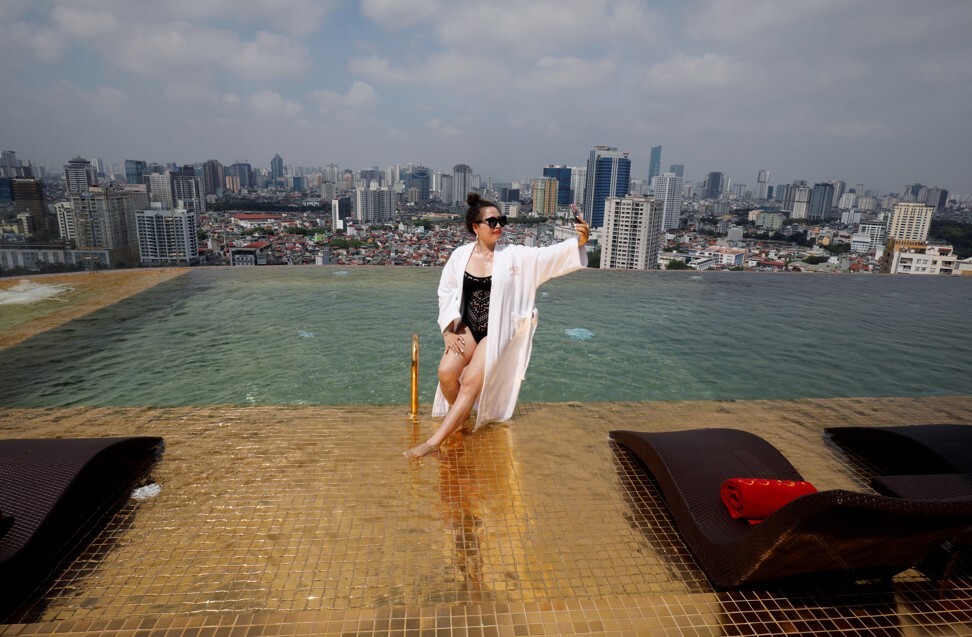
Tourist-free Koh Samui welcomes back hordes of turtle hatchlings, but pandemic is not all good news for nature
- The natural world is reasserting itself in holiday hotspots during coronavirus-related lockdowns
- But for Asia’s captive animals, the pandemic brings more problems with their keepers unable to feed them
The palm-fringed Thai island of Koh Samui has been a holiday hot spot for decades. Lonely Planet goes so far as to claim that “the most dramatic event in the island’s history was the first foreign tourist foot arriving on Ko Samui’s sands”. That foot is believed to have belonged to a volunteer from the Peace Corps, who sailed in aboard a coconut-trading boat blazing a now well-worn trail, first for intrepid backpackers and later, with the opening of Samui International Airport in 1989, for package tourists.
In 2018, a record 2.7 million travellers visited the 25km-long isle, according to the Bangkok Post. But international arrivals dropped in 2019 as Chinese tourists stayed away, put off by a strong baht, economic fallout from the brewing United States-China trade war and a fatal boat accident the previous year, which damaged the nation’s reputation. This year, with borders closed by the coronavirus pandemic, it is turtles, rather than tourists, that have taken over Koh Samui’s beaches.
In April, green turtle hatchlings emerged from nests on the stretch of sand in front of the Banyan Tree Samui and crawled to the water’s edge. According to the Department of Marine and Coastal Resources, it was the first time in six years this had happened.
On June 13, the Bangkok Post reported that sea turtles had returned to Laem Sor beach “for the first time in decades”. After spotting the marine reptiles’ footprints, local residents found 14 nests containing more than 1,000 eggs in total, of which 269 had hatched. When another nest was discovered a few days later, the provincial governor, Wichawut Jinto, told the newspaper: “This is good news for Koh Samui residents and Thais across the country.”

It was a similar story at the Silavadee Pool Spa Resort, which counted a record six Hawksbill turtle nests this year. Speaking to Sky News, resort manager Manuel Lang said, “[The turtles] only go to beaches where it is really quiet and there’s not much pollution, and the last couple of months, since there are no tourists here any more, the turtles have come to our beach even more than before.”
Nature’s resurgence has been one of few positives to arise from the pandemic. The irony that it takes a deadly pathogen, which passed from wild animals to humans because of our impact on the environment, to highlight the devastating effect we can have on the natural world should not be lost on anyone. But while images of goats gambolling through an otherwise deserted Welsh town and penguins waddling along streets in South Africa – or indeed, baby turtles entering the ocean from Koh Samui – are heart-warming, the idea that the animals are taking over is oversimplified.
Captive elephants from Thailand to India are starving without the tourism industry that supported them. However cruel the practice of keeping such creatures for entertainment (and Instagram feeds) might be, the sudden dearth of visitors means many mahouts are left without the money to feed their steeds. An elephant can eat up to 200kg of food a day.
Other animals are suffering, too. In May, the Indonesian Zoo Association started seeking funds “to save hungry animals from being killed and fed to one another”, according to The Straits Times.
Poaching is also on the rise across Asia as lockdowns keep rangers at home. In India, tigers, leopards and gazelles have become casualties of illegal hunting. In Cambodia, critically endangered giant ibises have been killed for their meat.
“Rural people have little to turn to but natural resources, and we’re already seeing a spike in poaching,” Colin Poole, of New York-based NGO Wildlife Conservation Society, told Associated Press last month. Al Jazeera reported that illegal fishing and logging are also on the rise.
But back on the beaches of Koh Samui, hundreds of hatchlings have benefited from the lack of visitors. Hopefully, when tourists eventually return, the environmental burdens they bring with them can be better managed to ensure that the turtles will keep returning, too.
Bali will reopen to international tourists on September 11

On July 5, more than 1,000 people put their hands together in prayer on the Indonesian island of Bali, expressing their gratitude for how the island was handling the coronavirus outbreak and “seeking blessings” for a new normal, reported online newspaper The Bali Sun. While the Island of the Gods has recorded just 23 deaths from Covid-19, its tourism-dependent economy has taken a huge battering.
No details were given about whether foreign visitors will be required to provide medical records or expected to quarantine, or, indeed, whether travellers from all countries will be equally welcomed.
Vietnam opens ‘world’s first’ gold-plated hotel

Magpies and wannabe Midases reading this can check in for US$250 per night, border reopening permitting.

